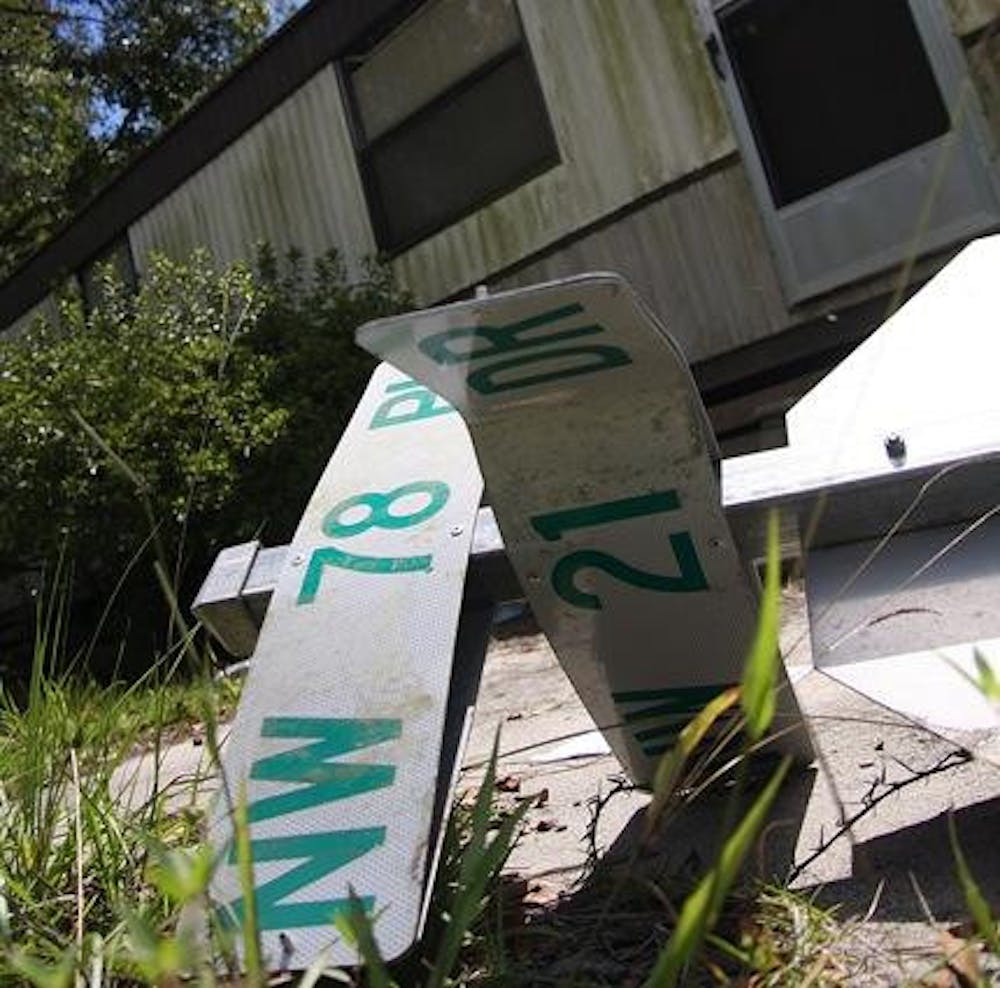David Bell has no place to go.
For 14 years, Bell and his wife have lived at Buck Bay Mobile Home Park, at 2149 NW 77th Ave.
Almost two years ago, Buck Bay was rezoned and sold. It will soon become a single-family housing development, which has forced former residents to relocate.
Some have faced difficulties.
"There's really nowhere to move a double-wide mobile home in Alachua County," Bell said. "I'm trying to get out of here as quick as I can."
The park officially closed Sept. 1, and 142 other lots have since been vacated.
Although owner Edwin Dix has said remaining residents must leave immediately, the Bells and one other woman remain there.
"We've just been sitting here while everybody else moves out," Bell said.
TWO-YEAR DEADLINE
Although the rezoning and sale of the land was legal, some still question the final decision.
Then-owner Tom Spain brought the proposal to rezone the land before the Gainesville City Commission two years ago, and commissioners passed it unanimously.
At the time, the commission was informed that residents of Buck Bay would be allowed to stay on the land, Commissioner Jeanna Mastrodicasa said.
Soon after the area was rezoned, it was bought for development by Edwin Dix, and residents were given two years to move.
Bell said residents of Buck Bay were not aware the area would be rezoned or sold.
Mastrodicasa said she felt the commission did not have all the facts.
"It's not a blame thing," she said. "It's that in hindsight, we probably would have done things differently."
When the plans changed, Mastrodicasa said, there was little the city could legally do for the residents of the mobile home park.
"We looked at what we could do for these people," she said. "We really tried our best to assist."
Dix said the two years he gave the residents of Buck Bay to relocate was plenty of time.
"It was 144 families out there," he said. "Now it's down to two people. You have to just move."
Dix said he feels he's been portrayed as a villain in his quest to build a development of affordable family homes.
"I didn't buy a mobile home park," he said. "I bought a single-family home division for me to build houses in."
OFFER OF ASSISTANCE
Concerns about the situation led the City Commission to create the Displaced Mobile Home Owner/Tenant Assistance Program in May 2007. The program offers Buck Bay residents monetary assistance to help with relocation costs. Financial assistance is also available from the state.
Residents moving within city limits may receive $3,000 from the city, said Andre Davis, housing finance coordinator for the Gainesville Housing Division. Those moving outside the city limits, but still within Alachua County, may be eligible for $1,500.
Eligibility requirements include a yearly total household income of less than 80 percent of the median family income, Davis said.
Former Buck Bay resident Marty Easters, who now lives at Progress Mobile Home Park, said she appreciated the city's attempt to help the residents, but the aid is nothing more than a drop in a bucket.
"It's just not enough," Easters said. "You just see how far $1,500 can take you."
The eligibility requirements for the program were also too strict for many at Buck Bay, she said.
Out of 36 families that have applied for assistance, 19 received help and 14 were declared ineligible. Three families are still waiting for approval, according to the housing division.
Easters said everyone, regardless of income, should have received $3,000, the highest possible aid from the program.
"Everybody gained but the people of Buck Bay," she said.
PLACEMENT OF BLAME
In the two years since the residents were told to relocate, fingers have been pointed from all angles.
Bell said he blamed Spain, the former owner of Buck Bay.
"He lied to everybody in here," he said.
Neither Spain nor any of his representatives could be reached for comment.
Others, including Easters, said Dix was at fault.
"It was strictly a realty deal," Easters said. "It was a money-making deal."
But Bell said Dix is just doing his job.
"He's a businessman," he said. "I feel bad for him because he's caught right in the middle of it."
Instead, Bell said he also blames the City Commission. They should have handled the situation differently, he said, though he didn't say how.
"You turned your back on Buck Bay," he said of commissioners.
Davis said the residents' feelings are understandable.
"You have people who've been out there 20 years," Davis said. "They hadn't anticipated moving. Any time you come in and you impact people's lives directly like that, they get upset."
A QUIET END
It's uncertain when legal action will be taken against the remaining residents of Buck Bay.
So far, three model homes have been built for Dix's affordable-home project, Eryn's Garden at Buck Bay.
"We're going to have that as a very nice subdivision," he said.
Meanwhile, Bell sits quietly on a plastic lawn chair on his front porch and looks out onto the street, covered in broken branches, fallen leaves, dead grass, dirt and construction materials.
"People would call us trailer trash, but we're not," he said. "We suffered the consequences."
Across from his home is a Komatsu crane next to an abandoned light-blue mobile home, which will soon be demolished.
Bell looks down at his crossed hands.
"It's been a lot quieter," he said. "You hear the frogs and that's it. There used to be children running down the streets, riding their bikes. You don't hear none of that no more."






